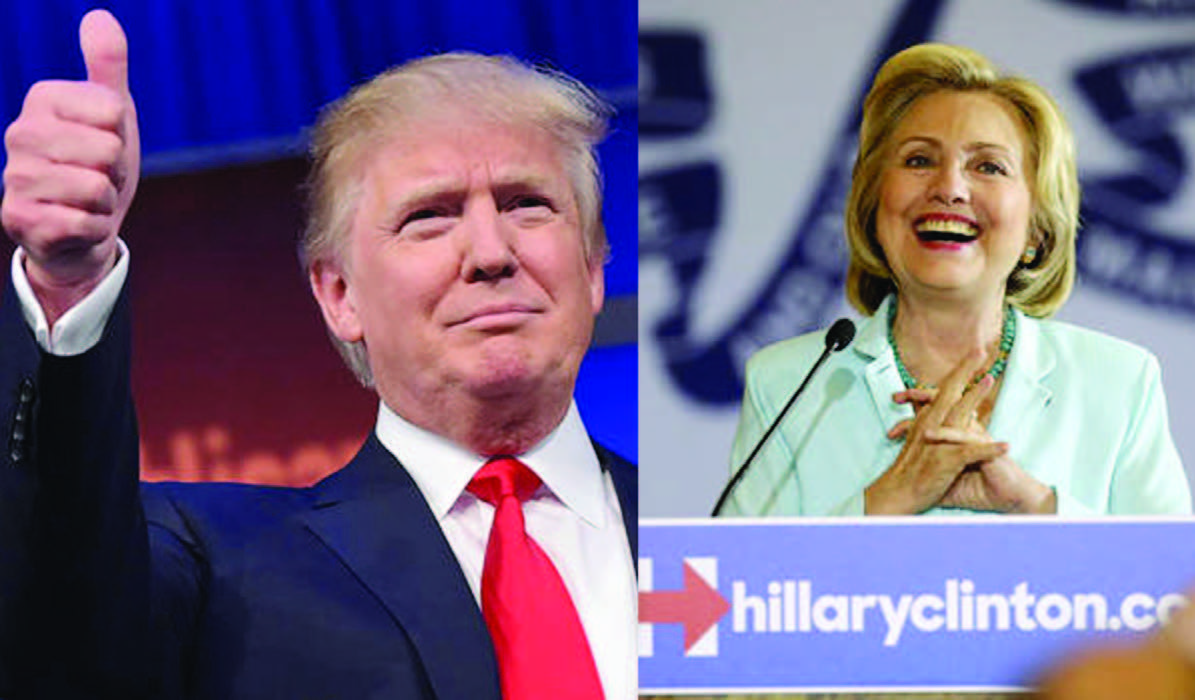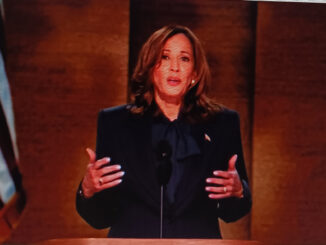
NEW YORK (TIP): Donald Trump and Hillary Clinton, the Republican and Democratic party frontrunners for US presidential nominations, have won their respective primaries in New York state.
New York helped both front-runners to solidify their lead. Mr. Trump won a commanding victory with 60% of the votes and scooped up most of his home state’s 95 delegates. John Kasich, the governor of Ohio, came a distant second with 25% of the votes and Mr. Cruz scored a measly 15%. “Thank you New York! I love you!”, Mr. Trump tweeted shortly after polls closed. In his short victory speech at Trump tower, his gleaming palace in Manhattan, the real-estate mogul thanked his family and his team and then declared that “we don’t have much of a race anymore…Senator Cruz is just about mathematically eliminated”.
Mrs. Clinton won an equally convincing 58%of the votes with the remaining 42% going to Mr. Sanders. There were 291 Democratic delegates at stake in New York; Mrs. Clinton bagged most of them. She had fought a surprisingly tough battle in the city, which she considers her home state, against Mr. Sanders, who hails from Brooklyn. In the two weeks since she lost in Wisconsin on April 5th, she campaigned tirelessly in the streets of the Big Apple. She danced the merengue in a Latino neighborhood in Washington Heights and devoured an ice-cream concoction called “Victory Mac Daddy” at an ice-cream parlor in the East Village. Meanwhile Mr. Sanders stuck to holding large rallies in Prospect Park and Washington Square Park, attracting tens of thousands of mostly young people.
Have the two front-runners wrapped up their respective nominations? They haven’t, though Mrs. Clinton is now very nearly unbeatable. Shedding her usual caution, she declared in her victory speech that “the race for the Democratic nomination is in the home stretch and victory is in sight”. She also reached out to Sanders supporters, telling them that “there is much more that unites us than divides us”. Mr. Trump on the other hand needs to continue to win in five important contests on the east coast next week (Pennsylvania, Delaware, Rhode Island, Connecticut and Maryland), in Indiana and most crucially in California, where voters go to the polls on June 7th and 172 delegates are at stake. He knows that he still has only a narrow path to get the 1,237 pledged delegates needed to avoid a contested convention in Cleveland, which is why he keeps whining about the “rigged” delegate system. Speaking to reporters on Staten Island on the weekend, Mr. Trump said he hoped that the July convention would “not involve violence”. “And I don’t think it will,” he said. “But I will say this: It’s a rigged system. It’s a crooked system. It’s a hundred-percent crooked.”
The New York vote was reportedly marred by voting irregularities, with numerous accounts of thousands being inexplicably stripped from voter rolls. This prompted the New York City comptroller to announce an audit to identify the problems in the primary vote. Mr. Sanders’ team probably rightly assumed that their candidate was especially affected by (often young) voters being barred from voting. “We are deeply disturbed by what we’re hearing from polling places across the state”, said a statement by the Sanders campaign. “From long lines and dramatic understaffing to longtime voters being forced to cast affidavit ballots and thousands of registered New Yorkers being dropped from the rolls, what’s happening today is a disgrace.”
Mr. Kasich was not in New York any more after the polls closed on April 19th, moving on to Maryland. He had done his bit of campaigning and eating in New York-he prompted snarky comments when he attacked a slice of pizza with a fork though he did better with chicken soup with replace and apple strudel. He won the island of Manhattan, where Mr. Trump is widely disliked, but did far less well than Mr. Trump in rural areas in upstate New York, which has been hit hard by job losses in recent years. Mr. Cruz would dearly like Mr. Kasich to quit the campaign, but the plucky Ohio governor thinks he can win a contested convention. Others want him to stay in the race merely to keep a voice of reason in the Republican contest. Mr. Cruz had also moved on to the next state, spending the evening of April 19th in Pennsylvania. He had offended New Yorkers when he attacked Mr. Trump in Iowa because of his “New York values” and however much he tried to qualify his insult in subsequent months, New Yorkers paid him back with a poor result. By now Mr. Cruz, like Mr. Kasich, has no chance of winning the required 1,237 pledged candidates to win the nomination. And, like the governor, he is staying in because he thinks he has a chance to win a contested convention.
Clinton seems to have locked up the Democratic race with a commanding win in the Empire State. She now leads Sanders by more than 250 pledged delegates leaving the superdelegates aside for the moment.
Sanders’ hope to win the race is effectively over. He would have to win a far larger share of the remaining delegates than he already has. Even his loyalists beganacknowledging on the night of the primary that Sanders could no longer catch Clinton in delegates. However, there’s a good case for him to stay in the race right until the Democratic National Convention scheduled for July.
For Donald Trump, a commanding win in New York-he won 90 of the 95 available delegates – delivering a massive blow to his critics since New York is considered to be the largest immigrant inhabited state-provides much-needed stability to a campaign that’s been in wild flux for weeks, roiled by losses, delegate troubles, and internal power struggles. The fact that Ted Cruz, his closest rival, was shut out entirely, makes the win sweeter for him and reinforces that he is the front-runner.
Yet Trump dreams are far-fetched as he needs 1,237 delegates to clinch the Republican nomination. He’d have to win about 63 percent of the delegates still on the board. That’s a higher proportion than what he’s won so far, but the field is smaller now, and the map ahead is thought to favor him, including as it includes several northeastern states and California. Trump has excelled in states with higher numbers of moderates.
Ted Cruz, meanwhile, is now mathematically eliminated from reaching 1,237, though he was practically denied that chance long ago. His hope is to keep Trump from getting there on the first ballot at the convention, and then snatch the nomination out from under him on subsequent ballots. That’s why Cruz has put so much effort into state conventions where delegates are selected, and he’s been very successful at placing his own loyalists in slots-much to Trump’s chagrin. As for John Kasich, the measly five delegates he won in New York doesn’t help him much. He’s still hoping for a miracle on the floor in Cleveland, as the party magically recognizes him as the strongest general-election candidate and crowns him the nominee. Good luck, governor.
But what if Trump doesn’t actually need to get to 1,237?





Be the first to comment